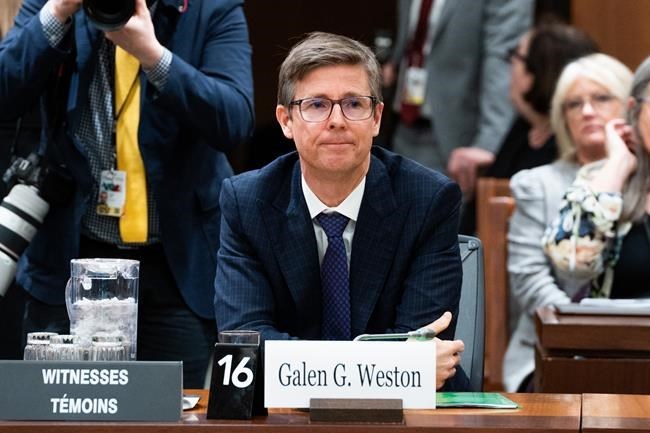As the grocery code of conduct nears completion, the Canadian industry's biggest player is raising concerns the guidelines could add fuel to the food inflation fire.
Loblaw Companies Ltd. said it’s worried the code could "raise food prices for Canadians by more than $1 billion" in a letter sent to members of both the steering committee developing the code and the industry sub-committee on Nov. 1, and obtained by The Canadian Press.
The grocer cannot endorse the code in its current form, wrote chief financial officer Richard Dufresne in the letter, requesting a special meeting of the industry sub-committee to address Loblaw's concerns.
In a statement, Loblaw spokeswoman Catherine Thomas said the draft code has "a number of challenges," which the grocer believes could risk product availability and increasing food prices. The Loblaw statement also mentioned the potential "$1 billion in costs," which Thomas said refers to extra costs for Loblaw customers.
Loblaw isn’t the only grocer to express concern about the code. Walmart Canada spokeswoman Sarah Kennedy said in an email in late October that the company supports initiatives benefitting customers but it’s "conscious of adding unnecessary burdens that could increase the cost of food for Canadians, especially during inflationary times."
Grocers have been under pressure from the federal government to stabilize food prices after a run of high inflation and a series of interest rate hikes have eaten into household budgets.
Michael Graydon, CEO of the Food, Health & Consumer Products of Canada association and co-chair of the steering committee developing the code, urged the two companies to give the code a chance. Without them on board, the code will be less effective, he said.
"Sign on, be active participants, be engaged," Graydon said, noting the code will be reviewed after its launch.
"But to just continue to sit on the sidelines and throw rocks at the process ... it’s not in the best interest of the industry."
The code is near completion, Graydon said, with plans to have it and the non-profit organization overseeing it up and running by the end of the first quarter of 2024.
Loblaw’s letter mentions specific sections of the draft code, saying it would make it harder for retailers to hold suppliers accountable, create a lack of certainty in the supplier-retailer relationship, and pose risks to prices, availability and discount programs.
Graydon said the committee doesn’t want to negotiate the points of Loblaw’s letter in the media, and would prefer to discuss it directly with them in an upcoming meeting.
However, he and Gary Sands, senior vice-president at the Canadian Federation of Independent Grocers and a member of the committee, pushed back on the $1-billion figure cited by Loblaw.
“There is absolutely no evidence to suggest the code would either raise food prices or negatively impact retailers’ ability to meet consumer needs,” said Graydon.
Sands said if he thought the code would be inflationary, he would raise the alarm too — but “we just don’t believe that that’s true.”
The committee developing the code was created in response to calls from the industry to address fees that large grocery retailers charge suppliers, an issue that surfaced publicly in 2020. That year, Walmart Canada announced a fee hike, and a national buying group representing Metro Inc. told suppliers it would expect the same. Not long after, Loblaw also raised its fees.
Michael von Massow, a food economy professor at the University of Guelph, said it’s not surprising to see two of the biggest names in the market — one the largest Canadian grocer, the other a major U.S. player — voicing concerns over the code of conduct.
“They, frankly, probably have the most to lose,” he said.
Metro and Empire Co. Ltd., which owns Sobeys, affirmed their commitment to adopting the code in statements Monday. Costco Canada did not respond to a request for comment.
If in the end, Loblaw and/or Walmart Canada decide not to sign on to the code, Graydon said another route may be necessary to address the sector's issues.
“I think we will need to have some very interesting conversations with a number of governments around regulation,” he said.
Quebec’s agriculture and food minister André Lamontagne, who co-chaired a working group announced in 2020 to look at the fees charged to suppliers by retailers, said it’s taken several years of rigorous work to get the code to the point it’s at today.
A report by that group in July 2021 noted a regulated or legislated approach to dealing with these fees would require provincial action, but that this could lead to a patchwork approach.
Lamontagne wouldn’t say whether Quebec will step in if the grocers don’t all agree to the code.
“I am always an optimist,” he said in an interview, conducted in French.
The federal food minister, too, wouldn’t comment on whether regulation might be necessary.
“In July, Federal, Provincial, and Territorial Ministers were briefed on the significant progress made during industry consultations held in May 2023, and remain united in calling for all key players in the industry, including large retailers, to participate in and support the operation of the Code,” said agri-food minister Lawrence MacAulay in an email.
But Von Massow said there has been, and likely still is, political appetite to step in with regulation if the code falls apart.
“I think that the current environment increases the appetite for doing that, and provides the perception that governments are doing something about affordability,” he said.
Graydon thinks with all the pressure on retailers to stabilize food prices and the accusations of ‘greedflation’ from consumers and politicians alike, it could also be a bad move for the grocers to say no to the code.
“I think it will be a public relations disaster for them,” he said.
— With files from Brett Bundale
This report by The Canadian Press was first published Nov. 7, 2023.
Companies in this story: (TSX:L, TSX:MRU, TSX:EMP.A)
Rosa Saba, The Canadian Press




